
| HOME |
| NERVE |
| REVIEWS |
| ARCHIVE |
| EVENTS |
| LINKS |
| ABOUT US |
| CONTRIBUTORS |
| BACK ISSUES |
| CONTACT US |
Unsung - a play about the extraordinary life of Edward Rushton
 Directed by Matt
Rutter
Directed by Matt
Rutter
Held at the old Unemployed Centre, Hardman Street
Saturday 16th November 2013
Reviewed by Ritchie
Hunter
Painting of Edward Rushton by Mike Jones (from the mural in the old Unemployed
Centre)
Anyone wondering what became of the old Unemployed Centre will be interested to know that there is an occupant who still takes notice of proceedings from his place high up in the dome. He may not be too happy that plans for this building include luxury flats, but he’s sure to welcome the use of the building for radical art staged by the Everyword Festival in partnership with DaDa Fest and Turf Love.
Edward Rushton, Liverpool's Blind Poet, Revolutionary Republican and Anti-Slavery Fighter will be giving a wry smile as he listens to the first reading of a play, a work in progress, about himself, to mark 200 years next year of his death.
Until recently Rushton was not part of the written history of this city, although his story was passed down by word of mouth. So it is a credit to all the people who have discovered his tale, in archives scattered worldwide.
Rushton’s life story is rich with events – from his rescue of a ship out in the Mersey Bar at the age of sixteen, through his tragic loss of sight from a disease he caught as he helped slaves, to his hatred of any injustice such as the pressgang. He wasn’t afraid to stand up for the rights of the oppressed, in a city obsessed with squeezing vast profits from the slave trade, which attacked anyone who challenged their right to do so.
This reading – the first half of the play – takes us up to the fall of the first abolition of slavery bill in 1791 and Rushton’s drafting of a letter to US President George Washington (who still owned slaves).
“Shame! Shame! That man should be deemed the property of man; or that the name of Washington should be found among the list of such proprietors.”
We meet many of the well known characters of Rushton’s day including William Roscoe and Thomas Clarkson, who is travelling the country gathering evidence from seafarers about the trade in ‘Black Gold’. We also meet Rushton’s wife Isabella and, as in the rest of his life, Rushton is uncompromising with her pleas not to be so confrontational, although his stubbornness does waver under her urgings to think of the family.
As the actors leave the stage we are nicely set up for the second half of this play. Rushton has just dismissed the paternalistic philanthropy of his contemporaries, led by Roscoe, who want to concentrate on the single issue of making a better life for the slave. He shouts:
“The fight for right to vote, Catholic emancipation, the right of workers to combine in trade unions, liberty from slavery everywhere. All these struggles are connected!”
After this inspiring glimpse of the play a feedback session led by Ruth Gould of DaDaFest begins with the writers John Graham Davies and James Quinn. Steve Binns, the local historian, gives his usual gritty, and witty, assessment. And Alex Robinson, who is still gathering material about Rushton, talks about his poetry.
A reading of the whole play will split the air at the Bluecoat on Tuesday, 26 November 2013.
For more on Edward Rushton click here: http://www.billhunterweb.org.uk/books/forgottenhero.htm
For a copy of the book about Edward Rushton, ‘Forgotten Hero’, written by Bill Hunter, call in at News from Nowhere on Bold Street.
Sorry Comments Closed
Comment left by johno on 19th November, 2013 at 11:32
the everyword is the everyman and playhouse who now own or have the building
will it be used now? see Liverpool post this week photo of mural and story. btw is willy Rushton related to him?
Comment left by diane on 22nd November, 2013 at 12:13
What time at the Bluecoat on 26 November 2013 and how much? It is not listed on The Blucoat site.